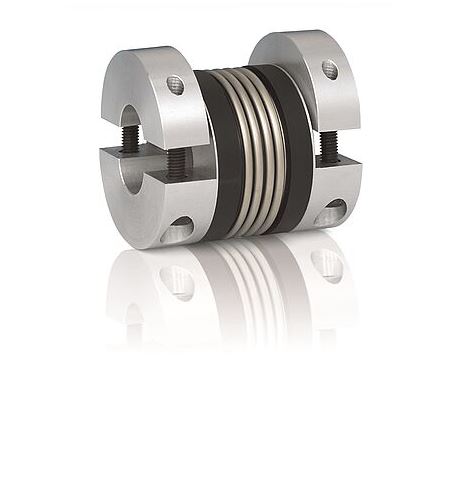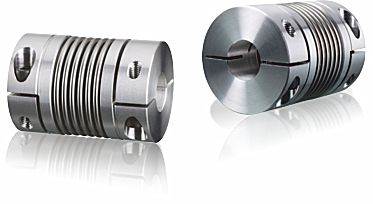Product Description
Densen customized Metal Bellows Clamp Type Spring flexible shaft Coupling for Step Motor
| Product Name | Metal Bellows Clamp Type Spring flexible shaft Coupling for Step Motor |
| DN mm | 12~160mm |
| Rated Torque | 25~25000 N·m |
| Allowable speed | 15300~1500 N·m |
| Material | 35CrMo/ZG270/45# steel/Aluminum alloy |
| Application | Widely used in metallurgy, mining, engineering and other fields. |
Product show
Company Information
Equipment
Application Case
Typical case of diaphragm coupling applied to variable frequency speed control equipment
JMB type coupling is applied to HangZhou Oilfield Thermal Power Plant
According to the requirements of HangZhou Electric Power Corporation, HangZhou Oilfield Thermal Power Plant should dynamically adjust the power generation according to the load of the power grid and market demand, and carry out the transformation of the frequency converter and the suction fan. The motor was originally a 1600KW, 730RPM non-frequency variable speed motor matched by HangZhou Motor Factory. The speed control mode after changing the frequency is manual control. Press the button speed to increase 10RPM or drop 10RPM. The coupling is still the original elastic decoupling coupling, and the elastic de-coupling coupling after frequency conversion is frequently damaged, which directly affects the normal power generation.
It is found through analysis that in the process of frequency conversion speed regulation, the pin of the coupling can not bear the inertia of the speed regulation process (the diameter of the fan impeller is 3.3 meters) and is cut off, which has great damage to the motor and the fan.
Later, they switched to the JMB460 double-diaphragm wheel-type coupling of our factory (patent number: ZL.99246247.9). After 1 hour of destructive experiment and more than 1 year of operation test, the equipment is running very well, and there is no Replace the diaphragm. 12 units have been rebuilt and the operation is in good condition.
Other Application Case
Spare parts
Packaging & Shipping
Contact us
/* January 22, 2571 19:08:37 */!function(){function s(e,r){var a,o={};try{e&&e.split(“,”).forEach(function(e,t){e&&(a=e.match(/(.*?):(.*)$/))&&1

What are the Maintenance Requirements for Bellows Couplings to Ensure Reliable Performance?
Proper maintenance of bellows couplings is essential to ensure their reliable performance and extend their service life. Here are some maintenance requirements and practices for bellows couplings:
- Regular Inspection: Perform routine inspections of the bellows coupling to check for any signs of wear, damage, or misalignment. Look for cracks, tears, or deformation in the bellows element, as these issues can lead to coupling failure.
- Lubrication: In most cases, bellows couplings do not require lubrication. However, some specific applications or coupling designs may benefit from periodic lubrication of the shafts. Always follow the manufacturer’s guidelines regarding lubrication, as using the wrong type of lubricant can damage the coupling.
- Keep the Coupling Clean: Ensure that the bellows coupling and its surroundings are clean and free from debris. Dirt, dust, and foreign particles can accelerate wear and reduce the coupling’s performance.
- Avoid Overloading: Do not exceed the maximum torque and speed limits specified by the manufacturer. Overloading the coupling can cause premature failure and compromise the system’s performance.
- Address Misalignment and Shaft Movement: If misalignment or shaft movement occurs during operation, identify and correct the root cause promptly. Excessive misalignment or axial motion can put extra stress on the bellows and lead to premature failure.
- Inspect Fasteners: Check and tighten the fasteners, such as set screws or clamping screws, that secure the coupling to the shafts. Loose fasteners can cause the coupling to slip or shift, affecting its performance.
- Replace Damaged Couplings: If any signs of damage or wear are detected during inspection, replace the bellows coupling with a new one. Continuing to use a damaged coupling can result in catastrophic failure and potential damage to connected machinery.
- Follow Manufacturer’s Guidelines: Always follow the maintenance instructions provided by the coupling manufacturer. They may have specific recommendations for inspection intervals, cleaning methods, and other maintenance practices.
By following these maintenance practices, you can ensure that your bellows couplings remain in good condition and deliver reliable performance throughout their operational life. Regular inspections and proactive maintenance help identify potential issues early, allowing you to take corrective actions before they escalate into more significant problems.

Are Bellows Couplings Suitable for Use in Corrosive or Harsh Environments?
Bellows couplings can be suitable for use in corrosive or harsh environments, depending on the material they are made from and their design. The choice of material is a crucial factor in determining the coupling’s resistance to corrosion and its ability to withstand harsh conditions.
Common materials used in manufacturing bellows couplings that offer good resistance to corrosion include stainless steel and other high-grade alloys. Stainless steel is known for its excellent corrosion resistance, making it well-suited for applications in harsh or corrosive environments.
In some cases, bellows couplings can be coated or treated with specialized coatings to further enhance their resistance to corrosion. These coatings can provide an additional layer of protection, allowing the coupling to perform effectively even in highly aggressive surroundings.
It’s essential to consider the specific environmental conditions and the type of corrosive agents present when selecting a bellows coupling for use in such environments. Proper material selection and the appropriate protective measures can ensure the longevity and reliability of the coupling under challenging conditions.
Additionally, it is essential to consult with coupling manufacturers or experts to identify the most suitable coupling material and design for the particular corrosive or harsh environment in question. Customized bellows couplings may be available to meet specific requirements, providing further versatility in addressing the challenges posed by corrosive or harsh conditions.

What are the Different Types of Bellows Couplings Available, and Their Respective Applications?
There are several types of bellows couplings available, each designed to suit specific applications and requirements. Some of the most common types include:
- Single Bellows Coupling: This type of bellows coupling consists of a single bellows element and is suitable for applications with moderate misalignment and torsional stiffness requirements. It is commonly used in robotics, automation, and general motion control systems.
- Double Bellows Coupling: The double bellows coupling features two bellows elements with an intermediate shaft in between. This design offers higher torsional stiffness and increased angular misalignment capacity. It is often used in precision positioning equipment and applications requiring higher torque transmission.
- Flexible Beam Coupling with Bellows: This type of coupling combines the flexibility of a beam coupling with the compensating capability of a bellows coupling. It can handle moderate misalignments and provides a good balance between flexibility and torsional stiffness. It finds applications in medical devices, optical systems, and semiconductor equipment.
- Torsionally Rigid Bellows Coupling: As the name suggests, this coupling type offers exceptional torsional stiffness, making it suitable for applications where precise motion control and low torsional backlash are critical. It is commonly used in CNC machines, high-speed spindles, and other high-precision systems.
- Miniature Bellows Coupling: This type is specifically designed for applications with limited space and where low inertia is crucial. It is commonly used in small robotics, miniature positioning stages, and micro-machining systems.
- High-Temperature Bellows Coupling: This specialized coupling can withstand elevated temperatures, making it suitable for applications in harsh environments, such as aerospace, exhaust systems, and certain industrial processes.
The choice of bellows coupling type depends on the specific requirements of the application. Factors such as misalignment compensation, torsional stiffness, torque capacity, space constraints, and environmental conditions play a crucial role in selecting the appropriate coupling type.
When selecting a bellows coupling, it is essential to consider the coupling’s torque ratings, allowable misalignments, and operating conditions to ensure optimal performance and reliability. Consulting with coupling manufacturers or engineering experts can help in making an informed decision based on the specific needs of the mechanical power transmission system.


editor by CX 2024-03-15
